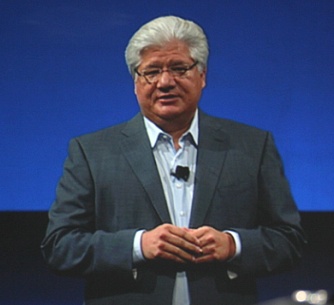BBX operating system for BlackBerry arrives

BlackBerry maker Research In Motion has unveiled its next-generation mobile operating system, BBX, which will provide a single platform for application development on a range of devices.

RIM's Mike Lazaridis has introduced the company's next-generation operating system, BBX, at the BlackBerry DevCon event in San Francisco. Photo credit: Jessica Dolcourt/CNET News
The Canadian company will use the same OS for its smartphones, tablets and embedded systems, including those in cars, RIM co-chief executive Mike Lazaridis said on Tuesday. BBX is based on the company's QNX tablet operating system, which is used in its PlayBook tablets, he said during a keynote speech at BlackBerry DevCon in San Francisco.
The future of RIM is one of "a single platform and a single vision, bringing together the power of QNX, of open standards and of BlackBerry", Lazaridis told the developer audience. "[It's] what we're doing to make the OS even better, transforming the tablet experience."
Developers will be able to write once using BBX for all new RIM smartphones, and for all existing and new tablets, the company said.
"With BBX, RIM is rebuilding the foundation for all its devices, including the iconic handhelds, and BBX begins to show some real promise in that sphere, with potential for a much more powerful, immersive and media friendly platform," Jan Dawson, chief analyst at Ovum, said in a statement.
On the business side, the new OS has a POSIX-certified microkernel, which has both EAL4+ security certification and IEC 61508 safety certification. These mean devices powered by BBX can get government clearances and will be easier to get approval in highly regulated industries. Dan Dodge, president of QNX software systems at RIM, described the company's approach to the operating system as "a long-term vision, linked to enterprise and cloud services".
RIM will support open standards in BBX, as it works with over 100 common libraries (including popular open-source frameworks), and it provides a Qt-based Cascade user experience framework. In addition, a native development environment will include support for common gaming platforms, among them Marmalade and Unity. "We have got it to the point where it's a one-click deploy," Marmalade chief executive Alex Caccia told the audience.
The native software development kit for the existing BlackBerry Tablet OS is now available, and a BBX-ready version is currently in beta, RIM said.
No Java support
In addition, RIM confirmed that its BlackBerry Java platform will not be ported to the next-generation OS, a move that will affect current BlackBerry developers. BBX applications will be written in HTML5, AIR or C++.
Developers who want to write applications that run on both the BlackBerry 7 OS and on BBX will need to write HTML5 applications using RIM's WebWorks toolkit, which Dodge described as "the bridge between BlackBerry 6, BlackBerry 7 and the new platform". It comes with full support for device hardware.
Java applications will not run on BBX. Alec Saunders, head of developer relations at RIM, told journalists that while the company has developed a Java environment for BBX, "we concluded that it wasn't an experience we wanted for our customers on BBX. We didn't believe it would have the capabilities".
"The adoption of QNX across the entire line... means that RIM is leaving its traditional BlackBerry developers high and dry. In fact, it's arguably providing better support for existing Android developers than it is for existing BlackBerry Java developers," Dawson said. "There simply is no migration path for existing developers, short of starting from scratch with an entirely new development environment."
Enterprise tools
RIM has not ignored its enterprise customer base with BBX. For example, it has added support for Bluetooth keyboards and mice, and provided tools for handling IT consumerisation in the platform. It has also tweaked its BlackBerry Balance tools, which separate out work content and personal content on devices, for the new operating system.
Alan Panezic, head of software at RIM, gave details of how BlackBerry Balance with BBX implements a separate secure partition for corporate applications and data. Applications in the corporate sandbox will appear in a Work application group and will require passwords to run, and data cannot cross the boundary between consumer and enterprise partitions.
RIM said it will provide businesses with tools to link its App World marketplace with corporate application catalogues, to ensure that mandatory applications are installed on provisioned devices.
Also at BlackBerry DevCon, RIM released an Android Player for its PlayBook tablets, alongside tools to help developers package existing Android applications for use on RIM's devices. It is encouraging Android developers to repackage apps for the new Android Player and BBX, with 70 percent of Android apps expected to need no extra work from now on.
In addition, the company is giving developers access to a preview of BlackBerry Tablet OS 2.0, which has support for WebGL and for Adobe's Flash 11 and AIR 3.0, including the new 3D features in the latest Flash platform. RIM has not announced a date for the launch of BBX, which is expected to arrive with new devices in 2012.
Get the latest technology news and analysis, blogs and reviews delivered directly to your inbox with ZDNet UK's newsletters.